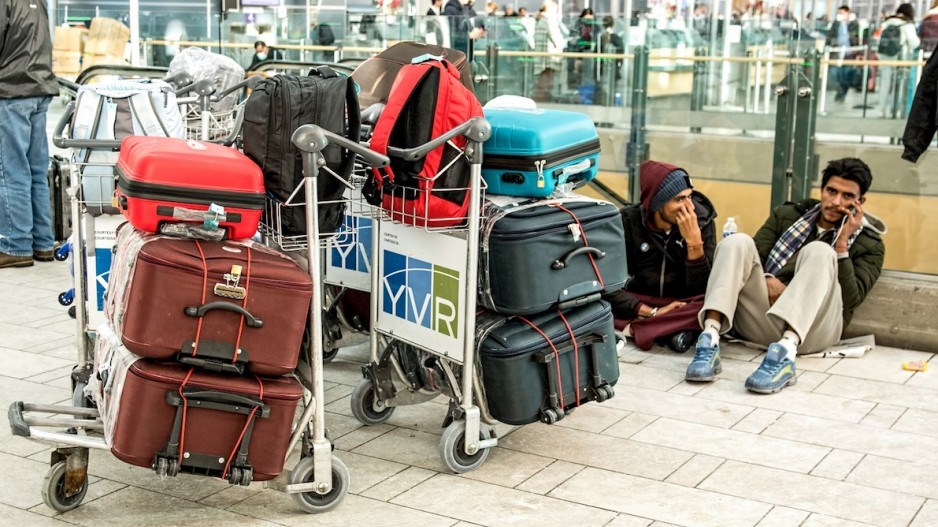Airline passengers, aviation-sector advocates and politicians are calling for sa���ʴ�ý’s transportation regulator to get tougher with airlines that regularly flout laws.
The overwhelmed Canadian Transportation Agency (CTA) is sorting through more than 30,000 air passenger complaints, many about airlines not compensating passengers, as is required by law.
A growing chorus is urging the CTA to address airline misconduct with financial penalties that are large enough to sting. Airlines would then have the incentive to operate in the best interest of passengers, and the number of complaints would plummet.
Canadian Transport Minister Omar Alghabra said earlier this month that he has a plan to reduce passenger complaints to the CTA by making airlines more responsible, although his vision was more of a plan to get a plan.
“We’re looking forward to figuring out what other measures can we put in our passenger bill of rights to make sure that the airlines are the ones who are responsible for these claims, not the CTA,” he said.
Alghabra studying airline operations and the air transportation chaos that transpired during the holiday season, but he had few concrete answers.
It is not clear if he will consider potential solutions such as allowing foreign carriers greater ability to carry passengers from point to point within sa���ʴ�ý – something that could improve service by adding competition for Canadian carriers.
The CTA, meanwhile, has a habit of levying minimum penalties to airlines, even when it is inundated by passenger complaints about the same issue.
In September, for example, the CTA issued 55 penalties of $200 each against WestJet Airlines Ltd. (TSX:WJA) for not compensating passengers for flight delays within a 30-day window, or explaining to the passengers why compensation was denied. The maximum penalty for each of those offences is $25,000. WestJet therefore was fined $11,000 instead of what could have been $1,375,000.
The CTA told BIV in an email that WestJet’s infraction was deemed to be a B-level offence, on a scale of A through D, with D being the most serious. The batch of 55 transgressions was also grouped together as a “first violation,” the CTA said.
First violations tend to merit entry-level financial penalties, it added.
Government inaction, however, is frustrating for the countless passengers inconvenienced by the , as extreme weather caused near shutdowns at airports such as Vancouver International Airport.
Passengers slept one or more nights on Canadian airport floors. Sunwing stranded hundreds of passengers in Cancun, Mexico for five days because the airline was unable to provide staffed planes to fly them home.
Toronto resident Kim Tanczos told BIV that when she boarded her Air sa���ʴ�ý (TSX:AC) flight to Vancouver, she was told that the plane had no room for her carry-on bag. The flight attendant assured her that her bag would go in the plane’s cargo hold, and Tanczos relented, she said.
Her bag wound up on a future flight to Vancouver, which caused her to panic because it contained vital insulin medication for Tanczos’ daughter, she said.
Tanczos is among those urging Alghabra to issue a general directive to the CTA to increase its financial penalties when airlines break laws.
NDP transport critic Taylor Bachrach and Air Passenger Rights president Gabor Lukacs told BIV that Alghabra should not meddle in specific CTA investigations, but that he should issue a general directive to the regulator saying that he wants the CTA to levy stiff-enough fines to airlines that violate laws to make them change their behaviour.
Bachrach said the upper limits of current financial penalties should be higher.
“Given the size of the companies involved, raising the maximum fines is probably warranted,” said Bachrach, who represents the sa���ʴ�ý riding of Skeena–Bulkley Valley.
“Even with the thresholds set where they are, the CTA is not using that tool [of financial penalties] effectively. Ultimately, we want to get to a point where airlines are abiding by the stipulations of the Air Passenger Protection Regulations, and we’re not there yet.”
He said Alghabra’s actions stood in stark contrast with those of U.S. Secretary of Transportion Pete Buttigieg, whose country also faced airline and airport chaos during the holidays.
Buttigieg immediately released a statement saying that his department “will mount an extraordinary effort” to ensure that Southwest Airlines Co. (NYSE:LUV) would meet its obligations to customers, including giving refunds.
That airline endured countless multi-day flight cancellations that stranded thousands of passengers and crew nationwide.
Lukacs said Alghabra should take strong action or resign.
He said the CTA, Transport sa���ʴ�ý and airline officials are too cozy with each other and this leads to airline executives believing that they are able to act with relative impunity.
Lukacs pointed to federal court documents released as part of a court action that his passenger-rights advocacy group launched against the CTA and the Canadian government.
The documents include an email string between Transport sa���ʴ�ý officials early in the pandemic discussing airlines’ request to have the government allow them to provide vouchers to passengers who booked flights that were cancelled, instead of providing full refunds, which is the law.
“Provincial law says passengers have to get refunds if they paid using credit cards, and the regulator has been acting to defeat provincial law,” he said.



